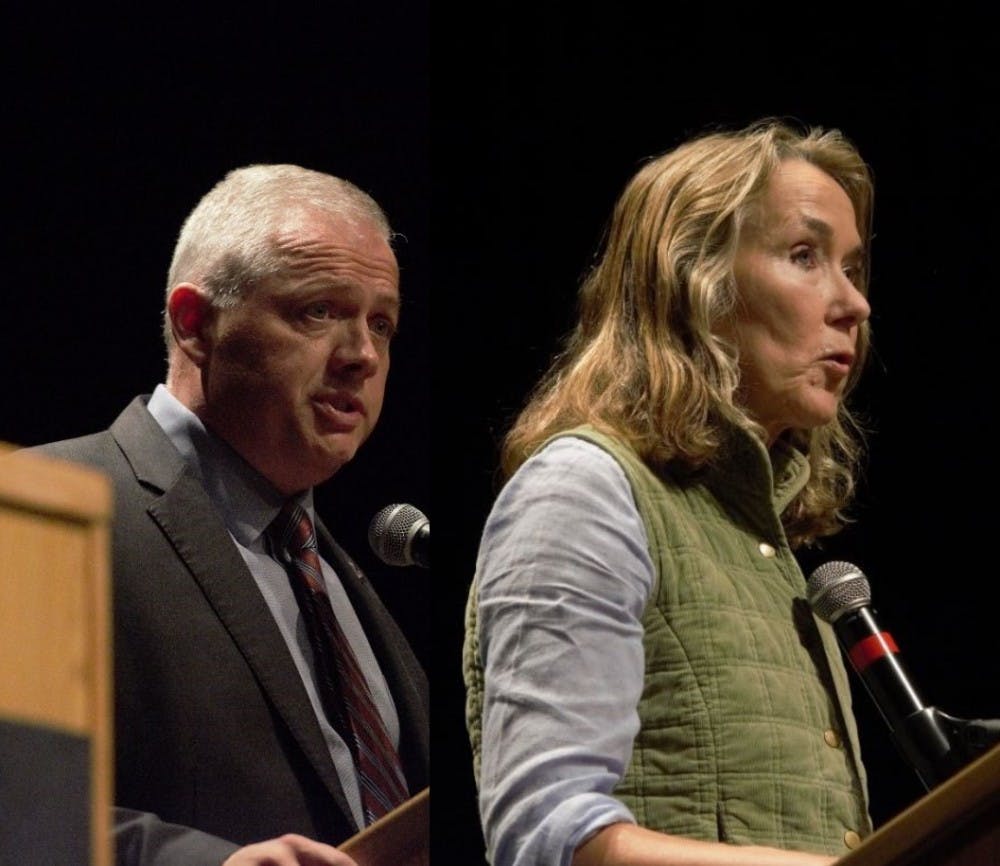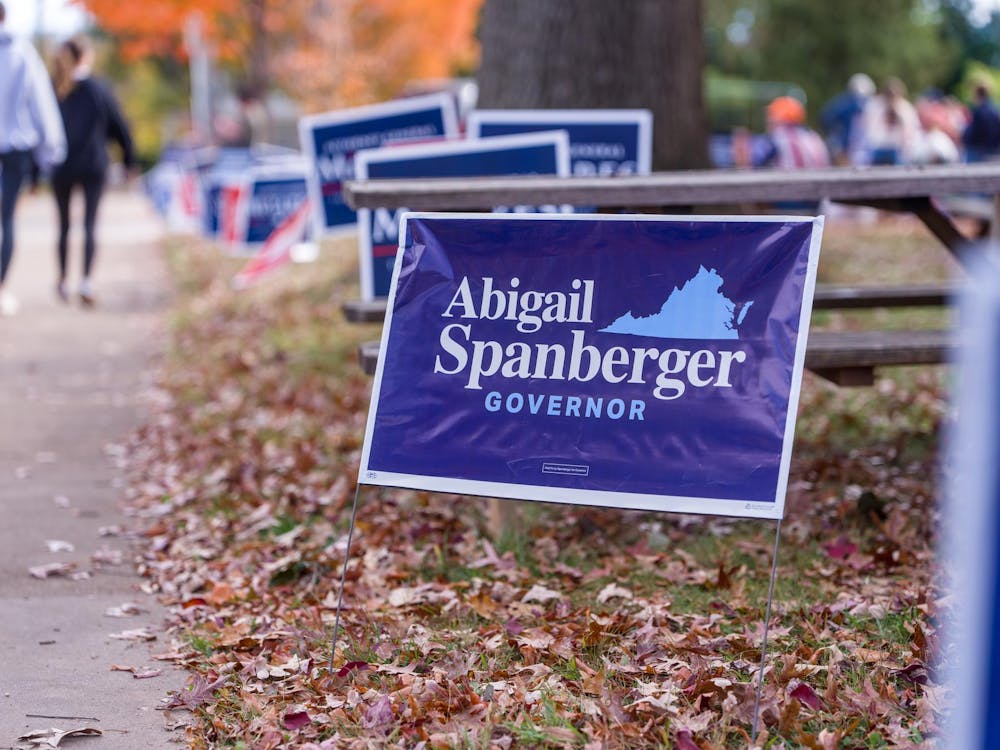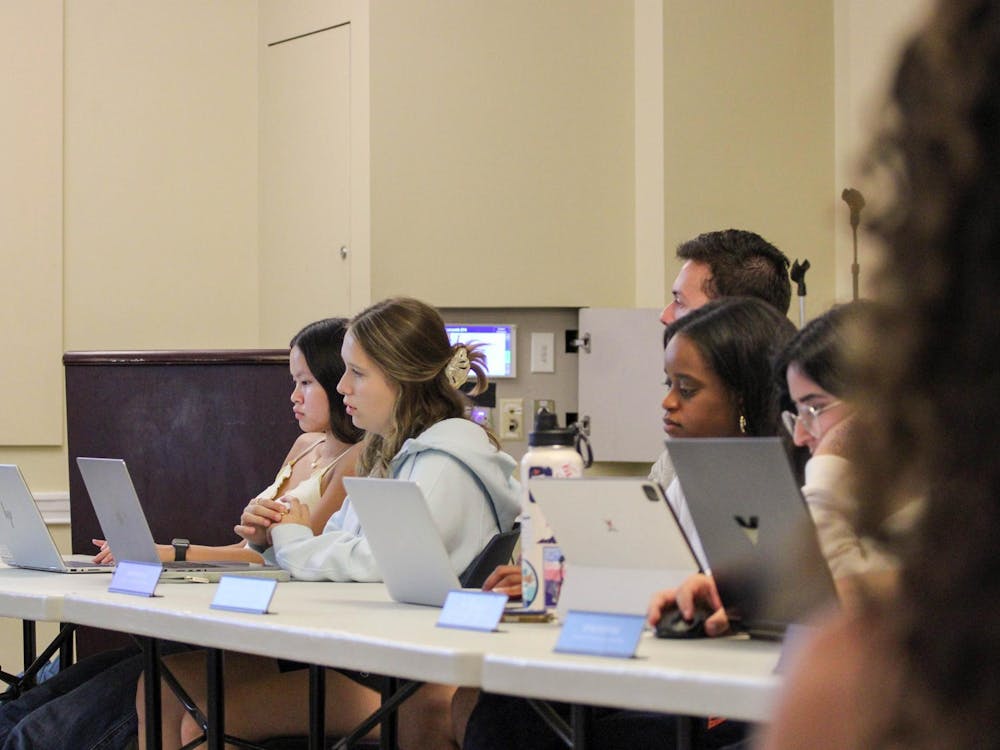Fifth Congressional District candidates, Democrat Leslie Cockburn and Republican Denver Riggleman, squared off Monday evening at Piedmont Virginia Community College for their first televised debate. The two candidates spoke on issues such as government spending, climate change and social justice.
The debate — sponsored by PVCC and CBS 19 News in Charlottesville — was moderated by CBS19 News anchor Tyler Hawn and featured questions from a panel of local journalists as well as PVCC faculty and students.
Cockburn, a former investigative journalist and first-time candidate, and Riggleman, a former Air Force intelligence officer and craft distillery owner, are competing for the seat currently occupied by Rep. Tom Garrett (R-Va.), who announced in May he would not seek reelection.
Cockburn said she hopes to promote free community college in the Fifth District. She added that government intervention is needed to address the mounting student debt crisis, calling funding for higher education an “absolute priority.” Cockburn also called for a tax-deductible and reduced interest rates on student loans as well as a need for the ability to declare bankruptcy when former students find themselves unable to pay off loans.
In contrast, Riggleman said he would like to see a withdrawal of the federal government from higher education funding. He instead pointed toward military service and the Federal Perkins Loan program — which provided federal student loans for undergraduate and graduate students with exceptional financial need before Congress ended the program in 2017 — as a way to finance higher education before arguing for increased federal funding to vocational schools.
When asked about the Atlantic Coast Pipeline project, Riggleman said he would address concerns through the lens of private property rights — as a self-proclaimed “critical infrastructure expert,” he said he hopes to balance a desire to grow independent critical infrastructure with private property protection.
Cockburn contended that the pipeline project goes well beyond private property rights as is relates to climate change which Cockburn called one of the “most critical issues” of her campaign. In particular, she said the construction of natural gas pipelines in the region could leak the greenhouse gas equivalent of 45 coal fire plants into the environment, as found in a 2017 report by Oil Change International.
The ACP is a 600 mile natural gas pipeline which is slated to run from West Virginia, through much of Central Virginia — including Nelson County south of Charlottesville — and terminate in southeastern North Carolina. Construction work on the project was halted earlier this year by the Federal Energy Regulatory Commission after a federal court revoked two of its permits but resumed last month.
However, Riggleman and Cockburn generally agreed that manmade climate change is a real and existential threat in the modern world.
“Whether you're a Republican or a Democrat, [you have to conclude] that there are climate change issues based on human activities,” Riggleman said. “It’s okay to be bipartisan on this type of stuff, it’s okay to believe in science. What I don't want to do is have science become sort of a religion where we’re taking jobs away from people rather than having some kind of incremental way of making sure change happens.”
Riggleman also stressed the importance of balancing the science of climate change with promoting job creation and economic growth through the creation of a non-partisan commission to deregulate the economy to allow for green energy companies to compete with fossil fuel.
However, Cockburn said Riggleman’s left-leaning views on climate change reform would likely conflict with his identity as a Republican. She also cited a recently completed report by the United Nations detailing the potential damages to the Earth from climate change if collective action is not taken by 2040.
“He’s crossing boundaries here because the people he wants to join in Congress do not believe in climate change,” Cockburn said. “And I don't think that he’s going to be able to be a free actor in some of those votes.”
On the issue of healthcare, Cockburn and Riggleman disagreed sharply. Riggleman said the federal government should delegate most healthcare policy reform to individual states, while Cockburn said she believed in “medicare for all” and expressed ardent support for the Affordable Care Act — former President Barack Obama’s signature healthcare law which includes an expansion of medicaid programs and insurance coverage for millions of Americans.
However, Riggleman said he does not believe that healthcare is a “basic human right,” but added that the Obama-era policy of covering those with pre-existing conditions should be maintained.
Cockburn challenged Riggleman’s defense of coverage for pre-existing conditions as he intends to join the House Freedom Caucus if elected — a conservative faction in the House of Representatives — which she said opposes such coverage.
“Since I have never been in politics, I have the chance that nobody owns my vote,” Riggleman said in response. “If anybody thinks they hold my voting card or I can't make those types of decisions, that’s the good thing about being an independent thinking guy is that I can be in the Freedom Caucus and vote the way that I want to.”
“So if you don’t think I’m going to do that, then don’t vote for me,” he added amid laughter from the audience.
A number of PVCC students also asked questions of the candidates on a variety of topics, ranging from marijuana decriminalization to sexual assault on college campuses.
In response to a question about reducing the frequency of sexual assault in the U.S., Riggleman said the education of students and support groups for victims of sexual assault on college campuses were key strategies for improvement.
“I think a lot of it comes to educating females, specifically in the fraternities and sororities that they're a part of, but there are certain groups that are actually being created at JMU [James Madison University], at other universities where they are actually educating on and also trying to make sure that people report,” Riggleman said.
He added that perpetrators of sexual assault should be punished to the fullest extent of the law.
“I’m a fan of law enforcement,” Riggleman said. “As a dad, with three daughters, I’ll tell you this — I think rape, sexual assault, anybody who imposes their will on another in a way that’s that evil and dastardly needs the maximum force of law throw at them … We’re to a point that we’re sick and tired of our daughters and sons in this environment. I also think that sons need to be educated.”
The Daily Progress reported that after the debate, Riggleman clarified his comments, saying that he believed education for both men and women is essential for sexual assault prevention.
Cockburn said local sexual assault prevention and advocacy organizations — such as Charlottesville’s Sexual Assault Resource Agency — need federal funding to further their efforts, adding that, “We need to make sure rape kits don’t sit on the shelf for years at a time” with regards to collecting evidence against alleged perpetrators of sexual assault.
Both candidates agreed that marijuana — currently a Schedule I drug — should be decriminalized, particularly in light of the country’s opioid epidemic. Cockburn said decriminalization would also lead to a lower incarceration rate and mitigate disproportionate imprisonment of minority citizens.
“Medical marijuana should be freely available to those people who are now forced to deal with pain through opioids,” Cockburn said. “Decriminalization will take a lot of people out of jail. Right now, if you’re African American and you're male, you are 10 times more likely to be thrown in jail for a drug offense — that’s wrong.”
In response to a question regarding the protection of rights for the LGBTQ community, Cockburn and Riggleman found another area of common ground, each stating their belief that prejudice has no place in modern-day America.
“I think you’re saying if you’re going to protect all rights, you're going to protect the rights of everyone — it can't just be one person or another,” Riggleman said. “Everybody is the same in their opportunity in this country.”
However, the candidates again diverged sharply on the topic of the federal minimum wage, which is currently set at $7.25 an hour. While Riggleman said companies themselves should decide how much to pay their employees based on their local economic context, Cockburn said the minimum wage should be increased to $10 to $15 an hour.
“$7.25 is not a living wage,” Cockburn said. “So what happens in the Fifth [District] is that people who earn that end up working three jobs. Try to raise a family when you're working three or four jobs.”
Cockburn and Riggleman will meet again Oct. 22 starting at 5:30 p.m. in Lynchburg to debate. Election Day is Nov. 6.







